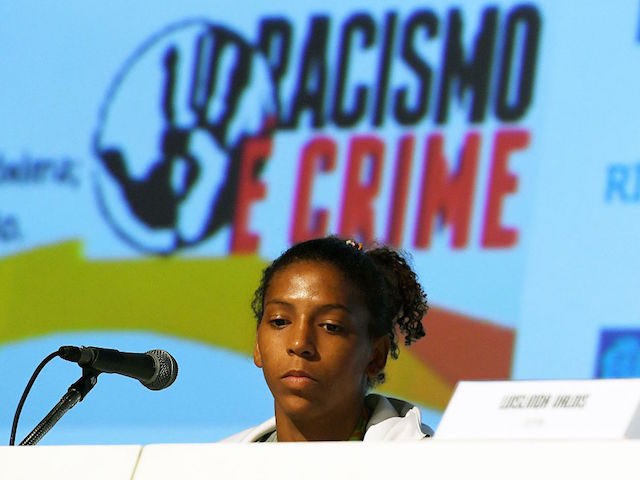The Brazilian Olympic Committee ordered all members of its Olympic delegation to undergo 30 hours of “anti-racism” training before departing for the Tokyo Games this summer.
Brazil’s Olympic committee “launched the 30-hour online course this week, which will be mandatory for all 650 athletes, coaches, doctors, nutritionists, officials, and other members of the country’s delegation to the Tokyo Games in July and August,” Agence France-Presse (AFP) reported on April 8.
“The course will give an overview of the history of racial inequality in Brazil, address what racism in sport looks like and teach members of the Olympic delegation what they can do if they witness or are victims of it,” according to AFP.
“The goal of the course is to provide information, knowledge and also open a broad debate on racism in sport,” Rogerio Sampaio, Secretary-General of the Brazilian Olympic Committee, told the French news agency on Thursday.
“Racism is structural … but we believe the sporting world can no longer tolerate it,” he said.
Former Brazilian Olympian Daiane dos Santos told AFP on Thursday she suffered from racism while competing for Brazil as a young gymnast, saying she “remembers teammates refusing to train next to her and coaches questioning why a black girl wanted to be a gymnast.”
“It made me develop character, which helped me survive that kind of oppression,” dos Santos said, adding that she thinks the Brazilian Olympic Committee’s new anti-racism training is “a great idea and a necessary one.”
“Let’s punish those who deserve to be punished, and take away any excuses,” dos Santos, 38, said.
Other Brazilian Olympic athletes have also said they were the victims of racism in the past. Rafaela Silva, gold medal winner for Brazil in women’s judo at the 2016 Rio Olympics, said shortly after her win that she was nearly forced to quit the sport of judo after suffering racist abuse online. The flood of internet comments came in response to Silva’s performance at the 2012 London Olympics, where she was disqualified for an illegal hold during the preliminary round.
“I was very sad because I had lost the fight,” Silva told the CBC in 2016 of her 2012 disqualification. “So I walked to my room, I found all those insults on social media, they were criticizing me, calling me monkey, so I got really, really upset. I thought about leaving judo.” Silva stopped training for a few months but eventually returned to judo and won Olympic gold in 2016.
A black goalkeeper for the Brazilian Olympic women’s soccer team, Bárbara Micheline do Monte Barbosa, suffered from a racist comment online while competing at the 2016 Rio Olympics.
“I hate blacks, but this Brazilian goalkeeper has a chance,” Marcos Clay, a Brazilian federal administrator from Rio Branco, wrote in a Facebook post in August 2016, referring to Barbosa. Various Brazilian media outlets published the quote, and Clay later apologized for the comment, calling it a “joke” and explaining he was not racist as his wife and several friends are black.
Prejudiced comments, including those regarding an individual’s race or religion, are illegal in Brazil under the country’s hate speech laws. A person found guilty of making “racist slurs” may be fined or sentenced to prison time.
Brazil was the last country in the Americas to abolish slavery in 1888. Brazil imported 4 million African slaves to the country over a period of 350 years, or 40 percent of all African slave imports to the Americas. The South American nation’s long history with slavery has produced a diverse modern population. Around 55 percent of Brazil’s 212 million inhabitants currently identify as “black or mixed-race,” according to AFP.
“Brazil’s diverse ethnic and religious makeup is often compared with that of the United States, and tensions run high. It has a legacy of slavery, a marginalized indigenous population, large immigrant clusters, and a majority Christian population that clashes with Afro-Brazilian religions,” according to the Christian Science Monitor.
The Spanish Olympic basketball team was accused of racism weeks before competing at the 2008 Beijing Olympics. The team posed for a photo used in an advertisement in which each member pulled back the outer corners of their eyes with their fingers, in a gesture interpreted by British and U.S. media outlets as racist against Asians. The Spanish courier company Seur, a sponsor of the basketball team, used the photo in an ad printed in the Spanish daily sports newspaper Marca before the team left for Beijing.
A member of the team, José Manuel Calderón, explained in a blog post that Seur had asked the team “to pose with a ‘wink’ to our participation in Beijing” for the advertisement, and that “we made an Oriental expression with our eye.”
“We thought it was something appropriate and that it would always be interpreted as somewhat loving,” he wrote. “Nevertheless, some of the European media did not see it this way.”
“We don’t interpret this gesture as offensive,” a Chinese Embassy spokesman in Spain told the Spanish newspaper El Pais at the time. “Ultimately there is a very good relationship between the Chinese and Spanish governments and there is no kind of conflict at all between the two peoples.”
“We understand the team has apologized and meant no offense. The matter rests there for the IOC,” International Olympic Committee (IOC) spokeswoman Giselle Davies told reporters in August 2008 when asked about the photo.

COMMENTS
Please let us know if you're having issues with commenting.